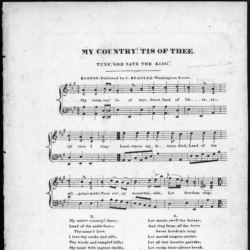| Yiddish (translation) | Source (English) |
|---|---|
דער נײער קאָלאסוס |
The New Collosus[1] Written in aid of Bartholdi Pedestal Fund 1883 |
ניט װי דער בארימטער, חוצפּהדיקער גריכישער גיגאנט מיט די צװינגענדיקע פיס צעשפּרײט פון לאנד צו לאנד, דאָ בא אונדזערע זוגפארגאנג־טויערן, באװאשן פון ים זאָל שטײן די פרוי די מעכטיקע מיטן פאקל, װעמענס פלאם ס׳איז דער פארשפּארטער בליץ, און ס׳װעט איר נאָמען זײן באקאנט װי די מאמע פון פארװאגלטע, פון איר לײכטנדיקער האנט צעשטראלט זיך איבער ברײטער װעלט װילקאָמע: און ס׳באפעלן אירע אויגן מילד דעם פּאָרט אונטערן הענג־בריק פון צװילינג־שטעט אן אײנגעראמטן װי א בילד: |
Not like the brazen giant of Greek fame, With conquering limbs astride from land to land; Here at our sea-washed, sunset gates shall stand A mighty woman with a torch, whose flame Is the imprisoned lightning, and her name MOTHER OF EXILES.[2] Cf. Megillah 29a.4. From her beacon-hand Glows world-wide welcome; her mild eyes command The air-bridged harbor that twin cities frame. |
״האלט זיך, פארצײטיקע לענדער, מיט אײער אויפגעבלאָזענער פּאָמפּאדע!״ פּראָקלאמירט זי מיט שװײגנדיקע ליפּן: אייערע ארעמע, די מידע, גיט זײ מיר, אײערע צונויפגעדריקטע מאסן, װאָס לעכצן נאָך א פרײען אטעם, דעם אומגליקלעכן אָפּפאל פון אײערע פרוכטבארע ברעגן, שיקט זײ, די הײמלאָזע, פון שטורעם געשלײדערטע, צו מיר, איך הויב־אויף מײן לאָמפּ איבער דער גאָלדענער טיר. |
“Keep, ancient lands, your storied pomp!” cries she With silent lips. “Give me your tired, your poor, Your huddled masses yearning to breathe free, The wretched refuse of your teeming shore. Send these, the homeless, tempest-tost to me, I lift my lamp beside the golden door!” |
This is the sonnet, “The New Collosus” (1883) by Emma Lazarus set side-by-side with its Yiddish translation by Rachel Kirsch Holtman. The translation appears in a section dedicated to Emma Lazarus in Holtman’s 1938 work, Fir Barimte Froyen (Four Famous Women). Lazarus famously penned her sonnet in response to the waves of Russian-Jewish refugees seeking refuge in the Unites States of America as a result of murderous Russian pogroms following the assassination of Tsar Alexander II in 1881. Her identification and revisioning of the Statue of Liberty as the Mother of Exiles points to the familiar Jewish identification of the Shekhinah (the Divine Presence, in its feminine aspect) with the light of the Jewish people in their Diaspora, as found in the Talmud Bavli, tractate Megillah 29a.4:
Rabbi Shimon ben Yoḥai says:
Come and see how beloved the Jewish people are before the blessed Holy One.
As every place they were exiled, the Shekhinah (Divine Presence) went with them.
They were exiled to Mitsrayim, and the Shekhinah went with them,
as it is stated: “Did I reveal myself to the house of your father
when they were in Mitsrayim?” (I Samuel 2:27).
They were exiled to Babylonia, and the Shekhinah went with them,
as it is stated: “For your sake I have sent to Babylonia” (Isaiah 43:14).
So too, when, in the future, they will be redeemed, the Shekhinah will be with them,
as it is stated: “Then YHVH your elo’ah will return with your captivity” (Deuteronomy 30:3).
It does not state: Hashem will bring back, (i.e., Hashem will cause the Jewish people to return,)
but rather it says: “Hashem will return,”
which teaches that the blessed Holy One will return together with them from among the various exiles.
Source(s)



“דער נײער קאָלאסוס | The New Collosus, a paean to the Shekhinah/”Mother of Exiles” by Emma Lazarus (1883, Yiddish translation by Rachel Kirsch Holtman 1938)” is shared through the Open Siddur Project with a Creative Commons Public Domain Dedication 1.0 Universal license.









ר״ש בן יוחי אומר
בוא וראה כמה חביבין ישראל לפני הקב”ה
שבכל מקום שגלו שכינה עמהן
גלו למצרים שכינה עמהן
שנאמר הֲנִגְלֹה נִגְלֵיתִי לבית אָבִיךָ
בִּהְיוֹתָם בְּמִצְרַיִם וגו׳ (שמואל א׳ ב:כז)
גלו לבבל שכינה עמהן
שנאמר לְמַעַנְכֶם שִׁלַּחְתִּי בָבֶלָה (ישעיהו מג:יד)
ואף כשהן עתידין ליגאל שכינה עמהן
שנאמר וְשָׁב ה׳ אֱלֹהֶיךָ אֶת־שְׁבוּתְךָ (דברים ל:ג)
והשיב לא נאמר
אלא ושב
מלמד שהקב״ה שב עמהן מבין הגליות